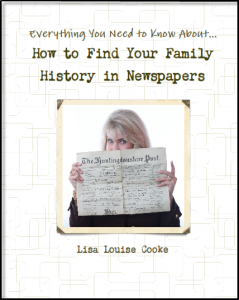Have you already searched for your relatives’ names at Chronicling America, the the Library of Congress’ web collection of digitized American newspapers? Well, search again!
Recently the the Library of Congress added more than 600,000 historic newspaper pages to its enormous collection. According to a press release, these pages include “first-time contributions from Iowa, Michigan, and West Virginia. Other new additions include content from Hawaii, Indiana, Illinois, Kansas, Kentucky, Louisiana, Minnesota, Montana, North Dakota, Oklahoma, Oregon, South Carolina, Tennessee, and Texas.” The site now has over 6.6 million searchable newspaper pages from over 1100 newspaper titles, published in 30 states and Washington, D.C. between 1836 and 1922.
 What are the chances your family will appear on one of those pages? Pretty good, actually. Here’s a list of the kinds of articles they may show up in from my book How to Find Your Family History in Newspapers:
What are the chances your family will appear on one of those pages? Pretty good, actually. Here’s a list of the kinds of articles they may show up in from my book How to Find Your Family History in Newspapers:
- Advertising: classifieds, companies your ancestor worked for or owned, grocery or dry goods stores ads (for historical context), runaway slaves search and reward, ship departures.
- Births & deaths: birth announcements, card of thanks printed by the family, obituary and death notices, “Community Pioneer” article upon passing, funeral notice, reporting of the event that lead to the death, or the funeral.
- Legal notices and public announcements: auctions, bankruptcies, city council meetings, divorce filings, estate sales, executions and punishments, lawsuits, marriage licenses, probate notices tax seizures, sheriff’s sale lists.
- Lists: disaster victims, hotel registrations, juror’s and judicial reporting, letters left in the post office, military lists, newly naturalized citizens, passenger lists (immigrants and travelers), unclaimed mail notices.
- News articles: accidents, fires, etc. featuring your ancestor; front page (for the big picture); industry news (related to occupations); natural disasters in the area; shipping news; social history articles.
- Community and social events like school graduations, honor rolls, sporting and theater events; social news like anniversaries, church events, clubs, engagements, family reunions, visiting relatives, parties, travel, gossip columns, illnesses, weddings and marriage announcements.
Learn more about researching family history with my book, available in both print and e-book format. And don’t forget to keep checking Chronicling America for stories and clues about your ancestors’ lives.
